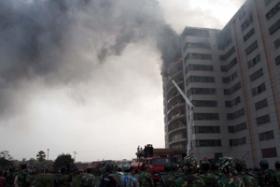
21 Workers Die at Bangladeshi Factory Fire
Bangladesh unions and international labour rights organisations are calling for immediate action from brands and the government of Bangladesh following a fatal factory fire which killed at least 21 workers and injured a further 50.
The Garib & Garib Sweater Factory in Gazipur, Bangladesh has been producing knitwear for Swedish retailer H&M, reportedly a main buyer from the factory. The company's own website cites Otto, 3Suisses International, Pimkie, Provera, Lindex, Littlewoods, Wal-Mart and JC Penny as other current and previous buyers. The CCC is currently trying to verify this and other sourcing information provided by workers.
The fire, seemingly caused by an electrical short circuit, started on the first floor of the seven story building at 9.30pm on Thursday February 25. As the fire spread, workers became trapped on the floors above. It appears, from witness statements and press reports, that emergency exits were blocked, the front gate was locked and fire extinguishing equipment was either missing or inappropriate. According to one survivor, rescue efforts were further hampered by the fact that firemen had to cut the window grills to access the building and rescue the trapped workers. No-one on the scene could tell fire fighters how many workers were in the factory at the time the fire began.
The National Garment Workers Federation and other organisations supporting the workers and their families call for:
- the immediate arrest of the factory owner,
- immediate payment of 500.000 Taka for the families of the dead workers;
- provision of medical treatment and necessary compensation for the injured workers;
- effective and immediate measures for compensation of the victims on the longer term, and
- a credible investigation into the circumstances under which this tragedy could have happened.
The Garib & Garib Sweater Factory case once again proves that company audits are failing to pick up serious violations of international labour rights and corporate codes of conduct, and that the labour inspectorate and government monitoring of labour laws is woefully inadequate. At the same time the constant repression of trade union organisation within workplaces and the failure of brands to work with trade union representatives means that workers themselves are unable to report and challenge health and safety violations. If the industry is really serious about preventing future deaths they must start involving workers directly in monitoring health and safety standards. This can only be done through supporting the right to organise and working directly with trade unions.